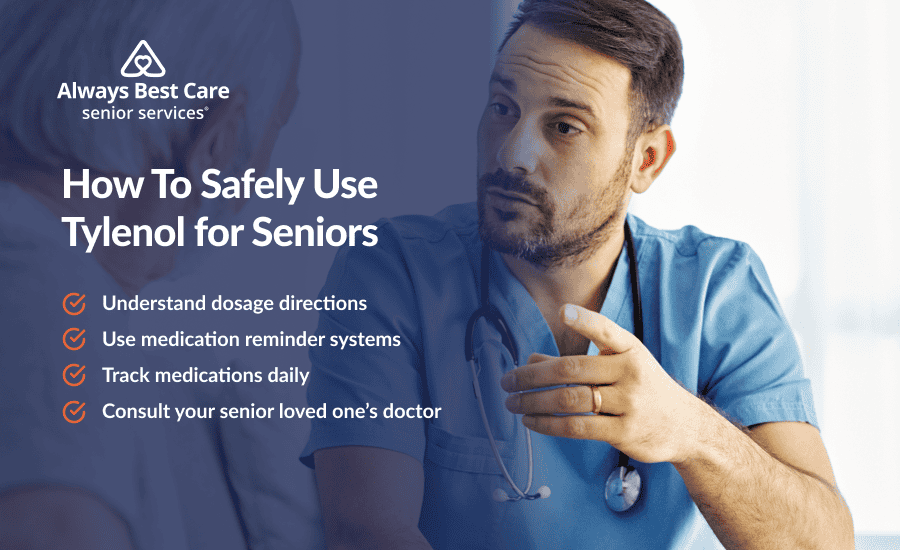Acetaminophen Side Effects in the Elderly [+ How To Safely Use It]
![Acetaminophen Side Effects in the Elderly [+ How To Safely Use It]](https://cdn.alwaysbestcare.com/wp-content/uploads/2024/11/acetaminophen-side-effects-hero-image-.png)
Table of Contents
Acetaminophen Side Effects: Key Takeaways
- While rare, some people might experience digestive issues like diarrhea or constipation
- Watch for symptoms such as loss of appetite, nausea, confusion, or jaundice
- Elderly individuals should stick to the lowest effective dose and aim to stay below 3,000 mg per day
Acetaminophen, commonly known as Tylenol, is generally safe when used as directed.
But like any medication, it can cause side effects, especially if it’s taken in high doses or used too often.
What many people don’t realize is that Tylenol overdoses are more common than you’d think. Each year in the U.S., they account for about 56,000 emergency room visits and 2,600 hospital stays.
If you’re caring for an elderly loved one, it’s important to understand how to use acetaminophen safely and what signs to watch for.
By the end of this guide, you will:
- Understand common and serious side effects to look out for
- Learn how to spot the warning signs of an overdose
- Explore how Always Best Care can provide in-home support and compassionate, expert care for your loved one
Common Acetaminophen Side Effects
Acetaminophen, commonly sold under the brand name Tylenol, is a non-opioid analgesic that relieves pain and reduces fever.
Acetaminophen regulates the body’s temperature and alters its perception of pain.
Tylenol is generally safe at recommended doses. However, elderly individuals might face higher risks of certain acetaminophen side effects due to physiological changes, including:
- Gastrointestinal issues: Although Tylenol is easier on the stomach than nonsteroidal anti-inflammatory drugs (NSAIDs), it can still cause gastrointestinal discomfort. This includes nausea, constipation, or diarrhea.
- Liver damage: Aging decreases liver efficiency. This raises the risk of liver damage from acetaminophen, especially if taken in high doses or with alcohol.
- Kidney damage: As kidney function naturally declines with age, long-term or high-dose use of acetaminophen may lead to kidney damage in the elderly, particularly if their kidneys are already compromised.
Does Tylenol Cause Constipation?
Yes, Tylenol can cause constipation.
While it is generally well-tolerated and considered safe when used as directed, some individuals, especially older adults, might experience constipation as a side effect.
This is more likely if they are taking other medications at the same time that slow down digestion, such as opioids or iron supplements.

Symptoms of Tylenol Overdose
Acetaminophen toxicity occurs when a person takes more than the recommended dosage of this medicine.
Top symptoms of Tylenol overdose include:
- Abdominal Pain, Upset Stomach: Tylenol can irritate the stomach lining, causing discomfort and cramping.
- Loss of appetite: Overdosing on Tylenol can disrupt digestive processes, leading to a reduced desire to eat.
- Seizures: An overdose can alter brain electrical activity, triggering convulsions or uncontrollable shaking.
- Diarrhea: Excessive Tylenol may irritate the gastrointestinal tract, causing loose, watery stools.
- Irritability: High levels of the drug can affect the central nervous system, resulting in mood swings and irritability.
- Jaundice: Jaundice occurs when excess bilirubin in the bloodstream dissolves into subcutaneous fat. This causes yellowing of the skin and eyes, which is a sign of liver damage.
- Nausea: Nausea is a frequent symptom of stomach and liver irritation following an overdose.
- Vomiting: The body may attempt to eliminate the toxin by expelling excess medication through vomiting.
- Coma: In very serious cases, taking too much acetaminophen can cause a coma, showing that the brain is not functioning properly.
What Is the Maximum Daily Dose of Acetaminophen for Elderly Individuals?
For older adults, it’s best to take only what’s needed and try to stay under 3,000 mg per day, especially if acetaminophen is used regularly.
How To Safely Use Tylenol for Elderly Patients
Because acetaminophen is often combined with other drugs, such as cough and cold medicines, it can be difficult for people to know how much they’re actually taking.
Here are tips on how to safely use Tylenol for elderly individuals:
- Understand dosage directions: Read and follow the dosage instructions carefully, ensuring you know the maximum daily allowance to avoid overdose.
- Consult your senior loved one’s doctor: Check with a healthcare professional to determine the appropriate single dose of acetaminophen, especially if your loved one has pre-existing conditions. For example, if your elderly relative has liver cirrhosis, their doctor may adjust the dosage or recommend an alternative medication.
- Avoid double-dosing: If your loved one misses a dose, simply continue with the next scheduled one instead of taking an extra dose.
- Use medication reminder systems: If your elderly relative struggles to remember their medications, set an alarm on your phone or align the medication schedule with daily routines like eating breakfast.
- Limit or avoid alcohol: Alcohol can increase the risk of liver damage, so elderly patients should limit or avoid it while taking Tylenol. Alcohol consumption forces the liver to convert more acetaminophen into toxic byproducts. Therefore, men should not exceed two standard drinks per day and women should limit themselves to one when using acetaminophen.
- Explore alternative pain management: Discuss other pain relief methods with your senior relative’s healthcare provider, such as physical therapy. This can help reduce Tylenol reliance and minimize potential side effects.
- Discover drug interactions: Ask your elderly loved one’s doctor about potential interactions between their prescription medications and acetaminophen. For instance, certain blood thinners and anti-seizure medications may increase the risk of adverse effects when combined with acetaminophen.
- Check for drug interactions: Talk to your loved one’s doctor about how acetaminophen may interact with other prescriptions, especially blood thinners or anti-seizure medications.
- Track medications daily: Keep a simple record of what’s been taken and when to prevent double-dosing and to detect any side effects early.
- Store meds safely: Place Tylenol and other medications in a well-lit, secure spot to reduce confusion, especially for those with memory or vision issues.

Manage Your Elderly Loved One’s Pain With Always Best Care
Tylenol is often a go-to for relieving everyday aches and pains, especially among older adults.
And while it can cause side effects, particularly if not taken properly, it’s generally safe when used as directed. That’s why having the right support can make all the difference.
At Always Best Care, our experienced caregivers help keep track of medication schedules, make sure doses are given correctly, and watch for side effects, so your loved one stays safe and well cared for.
We offer a range of services to help care for elderly individuals:
- In-home care services: We provide 24/7 care in your elderly loved one’s home, including pain management, chronic illness care, meal preparation, companionship, and personal care.
- Skilled home health care services: In certain areas, our therapists and home health aides craft personalized, convenient care plans for your loved one’s specific needs.
- Specialized home care services: Our experts offer daily social interaction and clinical insights into your loved one’s health, all from the comfort of their home.
- Senior living referral services: We’re here to help you find the ideal senior living options that match your loved one’s needs and preferences.
- Respite care services: We impart temporary relief for caregivers, ensuring your loved one receives continuous, compassionate care. We tailor the duration to meet your needs, from a few hours to several days.
- Dementia care services: Our team is dedicated to caring for elderly patients with dementia, making sure they feel comfortable, safe, and well-cared for every day.
- Veterans assistance program: We deliver exceptional care for veterans and help them access the funds they need for their care.
Acetaminophen Side Effects: FAQs
Can Tylenol cause constipation?
Yes, Tylenol might cause constipation, although it’s usually well-tolerated and less likely to do so compared to stronger pain medications like opioids.
Can Tylenol cause diarrhea?
Yes, Tylenol can cause diarrhea. But it’s not a common side effect when the medication is taken as directed.
Can my elderly loved one take Tylenol on an empty stomach?
Yes, your elderly loved one can take Tylenol on an empty stomach. Just make them take it with a glass of water.
How many days can elderly individuals take Tylenol in a row?
Elderly patients can take Tylenol for up to 10 consecutive days, unless their doctor advises otherwise.
How long does Tylenol stay in your system?
Tylenol typically clears from your system within 12 to 24 hours if you take it as recommended and have no significant health issues. Taking higher doses may extend this to a few days.
How quickly does Tylenol take effect?
Tylenol tablets take about 45 minutes to start working, while the effervescent tablets begin in as little as 20 minutes.
What should I do if my elderly loved one accidentally ingested too much Tylenol?
If your loved one overdoses on Tylenol, immediately call 911 or your local emergency number. You can also reach the Poison Help hotline at 1-800-222-1222 for assistance anywhere in the United States.





